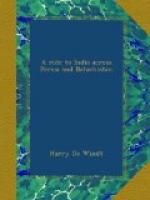“We have done with the snow now, monsieur,” said Gerome, as we rode next morning through a land of green barley and cotton plains, date palms, and mimosa. On the other hand, we had come in for other annoyances, in the shape of heat, dust, and swarms of flies and mosquitoes. Nearing the sea, vegetation entirely ceases. Nothing is visible around but hard calcined plain, brown and level, lost on the horizon seaward in a series of mirages, ending northward in a chain of rocky, precipitous mountains. The bright, clear atmosphere was remarkable; objects thirty or forty miles off looking but a mile or so away. About midday an unusual sight appeared on the horizon—two Europeans, a lady and gentleman, mounted on donkeys, and attended by a chalvadar on a third, who apparently carried all the baggage of the party. Halting for a few moments, and waiving introduction, we exchanged a few words. Mr. and Mrs. D—— were on their way to Teheran, with the object of making scientific researches at Persepolis and other parts of Persia. I could not help admiring the courage of the lady, though regretting, at the same time, the task she had set herself. To inquiries of “How is the road?” I replied, “Very good,” May the lie be forgiven me! It was told for a humane purpose.
Save a large herd of gazelle on the far horizon, nothing occurred to break the monotony of the journey through deep heavy sand till about 4 p.m., when a thin thread of dark blue, cutting the yellow desert and lighter sky-line, appeared before us. It was the Persian Gulf. An hour later, and Sheif, the landing-place for Bushire, was reached.
A trim steam-launch, with Union Jack floating over her stern, awaited us. She was sent by Colonel Ross, British Resident at Bushire, who kindly invited me to the Residence during my stay in the Persian port. I was not sorry, after the hot, dusty ride, to throw myself at length on the soft, luxurious cushion, and, after an excellent luncheon, to peruse the latest English papers. Skimming swiftly through the bright blue waters, we neared the white city, not sorry to have successfully accomplished the voyage so far, yet aware that the hardest part of the journey to India was yet to come.
At a distance, and seen from the harbour, Bushire is not unlike Cadiz. Its Moorish buildings, the whiteness of its houses and blueness of the sea, give it, on a fine day, a picturesque and taking appearance, speedily dissipated, how ever, on closer acquaintance; for Bushire is indescribably filthy. The streets are mere alleys seven or eight feet broad, knee-deep in dust or mud, and as irregular and puzzling to a stranger as the maze at Hampton Court.




